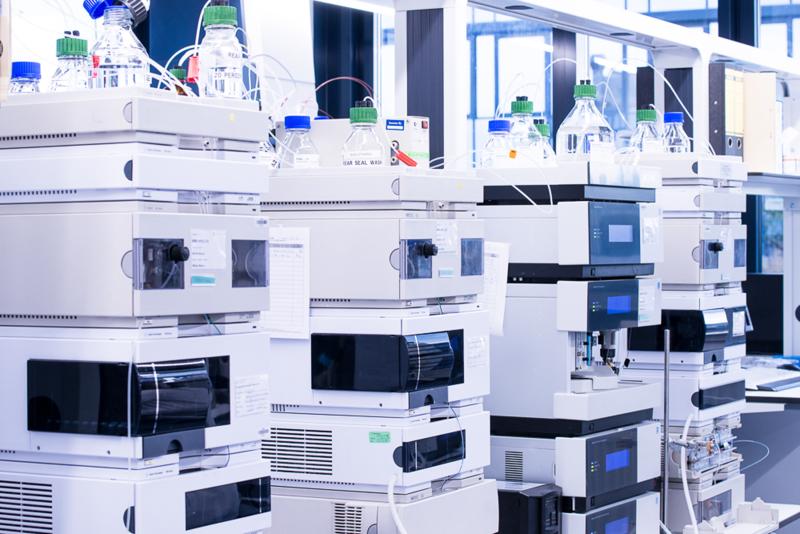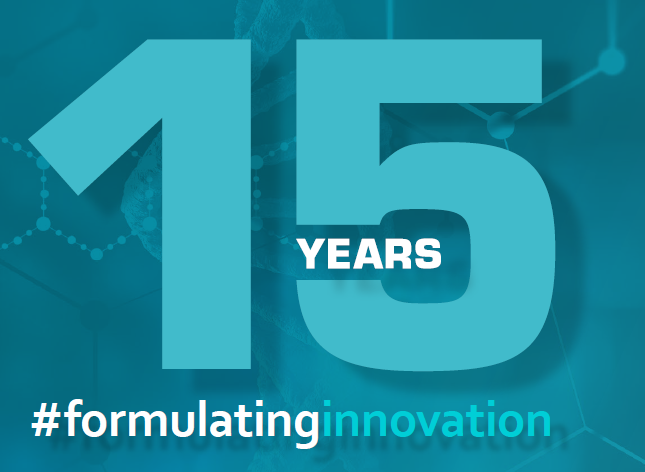High performance size-exclusion chromatography (HP-SEC)
Characterization and Quantification
of Protein Monomers, Fragments and Aggregates with HP-SEC

High performance size-exclusion chromatography (HP-SEC) is a well-established, robust and highly versatile technique. In HP-SEC, the sample is injected onto a column that is constantly flushed with mobile phase. The chromatography column itself contains fine and porous beads, which are composed of dextran, agarose, silica or polyacrylamide (the stationary phase). The beads allow small species to migrate into their pores, increasing their retention inside the column, while larger species migrate with the mobile phase without entering the bead pores. Thus, larger species reach the column end faster than smaller species. After separation, the various species are detected using following detectors:
- Ultraviolet (UV) absorption
- Fluorescence
- Refractive index (RI)
- Multi-angle laser light scattering (MALLS)
- Charged aerosol detection (CAD)
HP-SEC allows the sizing, quantification and molecular weight determination of fragments, monomers and aggregates. The size range of HP-SEC is defined by the pore size of the column and the method set-up (e.g., mobile phase, flow settings and column dimensions).
Quality & biosafety level of this method
We provide all our analytical services with the highest quality standards. Each project is carried out by experienced scientists and every report or data presentation is comprehensively checked by a scientific reviewer. HP-SEC is validated under GMP and available up to biosafety level S2.
Orthogonal techniques to HP-SEC
- Asymmetric flow field flow fractionation (AF4) offers an increased upper size limit, allowing for the analysis of larger aggregates and particle. Method development, however, may be more elaborate.
- Analytical Ultracentrifugation (AUC) characterizes samples in their native buffer while mitigating dilution effects. As a matrix-free separation technique, AUC is very suitable for the verification of HP-SEC results. The modern instruments operated by Coriolis can even reach the throughput of HP-SEC sequences.
Compared to these orthogonal techniques, HP-SEC generally offers a higher resolution and lower limit of detection. Verification of HP-SEC data with orthogonal techniques, such as AUC and AF4, is often recommended and can be performed by Coriolis during method development or on existing methods.
HP-SEC is commonly employed in all stages of research and development of biopharmaceuticals. It is highly valuable during formulation development, stability studies and forced degradation studies, but is most frequently used for batch release testing.
Standardized methods or dedicated method development
For common sample types, we can often apply standardized methods with little setup effort. On top of this, our experienced analytical scientists perform in-depth method development or method optimization tailored to your drug substance, product type and development phase. Under GMP, we also offer full method validation or compendial method verification.
Method development
During method development, we tailor sample preparation, method settings, and data analysis to the needs of your project and sample.
For this purpose, we include a representative sample and, where available, suitable reference standards and stressed/degraded materials. This way, our analytical scientists can design a method that is highly suitable for your needs, stability indicating, as well as robust and repeatable. Upon request, we compile a detailed method description for your records.
This can be applied under R&D and GMP. Read more
Method qualification
A method qualification is the initial assessment of the performance of an analytical procedure to show that it is suitable for the intended purpose.
During method qualification, our analytical scientists perform a documented testing that demonstrates that the analytical procedure meets certain acceptance criteria in several categories. These may include repeatability, linearity, intermediate precision, robustness and more. We compile a qualification plan and a qualification report including all relevant data.
This can be applied under R&D and GMP. Read more
Method validation
A method validation is the confirmation under highly controlled conditions that the performance of an analytical procedure is suitable for the intended purpose.
During method validation, our analytical scientists perform a documented testing, which demonstrates that the analytical procedure consistently produces a result that meets the pre-determined acceptance criteria. We compile a validation plan and a validation report including all relevant data.
This can be applied under GMP Read more
Contact us
Contact us
Any questions? Please contact Dr. Jörg Müller!
Phone: +49 89 41 77 60 – 111
Mail: joerg.mueller@coriolis-pharma.com


